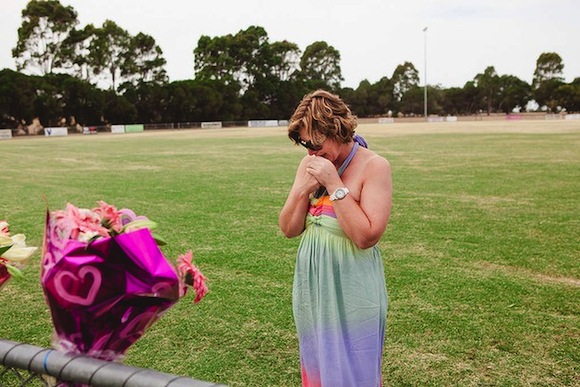
Law and order politics is routinely a mainstay of such campaigns, in particular marked by punitive, "get tough on crime" slogans that are often overwhelmingly preoccupied with street-based offences and violence between strangers. This year, however, a consensus appears to be emerging around family violence: historically a less talked about, more obscured, but nonetheless more troubling kind of violence in our community.
This has been propelled in part by public distress over high profile instances in which women and children have been killed by abusive male partners. Most prominent was the death of Luke Batty at the hands of his father, and his mother Rosie’s courageous and insistent call for better policy responses to be enacted in his wake. The public engagement this tragedy has triggered is a welcome development and may lead to substantive changes in the way family violence is dealt with.
This does not, however, mean that the responses offered by the major political parties so far have been straightforwardly positive.
Expert stakeholders have already offered insightful and informed solutions to help reduce family violence. What we appear to lack is political will for these more nuanced policy solutions
Earlier this year the Victorian Opposition declared the issue a national emergency, committing itself to a royal commission if elected. In a similar vein, child sex abuse has often been described as a national emergency here and internationally over the last few decades. However this has arguably carried greater symbolic weight over and above particular policy responses.
What is less clear is why a royal commission is needed in the first place. In welcoming the Opposition’s commitment, Rosie Batty qualified this by stating that "what is really important though is that funding for family violence workers is just so grossly under-funded right now that we need to start seeing changes now … before the royal commission starts, if it was to take place".
This is an astute, critical observation, and underpins a second question that appears to have been less remarked upon by the Opposition and others: why a royal commission? On what basis is this response to family violence justified over and above others? To recognise something as a national emergency does not inevitably mean that a royal commission should be established, or that merely convening it will magically provide the solution.
Royal commissions tend to be publicly well received when announced. This has been demonstrated most particularly by the current Royal Commission into Institutional Responses to Child Sexual Abuse.
But in the context of family violence what appears to be obscured is the fact that a royal commission is itself not a public policy. It is an investigative truth-seeking mechanism that attempts to identify the scope and contours of a problem, and to propose recommendations in response to this. The reality is that we already know much of this. Stakeholders such as Domestic Violence Victoria have already offered insightful and informed solutions to help reduce this problem. What we instead appear to lack is political will for these more nuanced policy solutions.
While the prevalence of family violence is far too common, and the fatalities far too numerous, we do not lack answers for what causes this pervasive problem. If we did, a royal commission (or indeed another commission of inquiry) may be a logical and effective remedy.
But as many survivors, stakeholders and specialists agree, the problem of family violence can be addressed through a series of responses that we already know will be effective. These include a whole of government response, allowing a much more robust and meaningful collaboration between agencies. This needs to be complimented with better funding, resources and wages for those working at the coalface. However these don’t easily translate into quickly digestible sound bites. Nor do they convey the apparent or symbolic significance of a ‘royal commission’.
My point is not to second-guess the Opposition’s motivation and concern, but rather to question whether a royal commission will bring about meaningful and positive improvements for vulnerable families.
The commissioning of inquiries can have paradoxical or unintended consequences. For example, if we already know the answers for more effectively addressing and preventing family violence, what good comes of delegating money, time and resources into a royal commission to further investigate this? Such a deferral may well have the contradictory effect of delaying or suspending meaningful policy action.
History shows that what is often most important is neither royal commissions themselves nor what they find. Instead, it is how governments respond to the findings and recommendations that emerge from them. The Opposition leader has committed to implementing any and all recommendations. But without knowing what these are, such a position may be regarded as suspect or politically expedient.
One of the most iconic examples of such complexities was the Royal Commission into Aboriginal Deaths in Custody, established in 1987 and concluded in 1991. While its importance should not be underestimated, the fact remains that the severe over-representation of Indigenous people within the criminal justice system persists. This is in part a result of the failure of state and territory governments to implement many of the recommendations of the inquiry.
This demonstrates that royal commissions can be important, and may be effective in identifying relevant policy responses, but this is qualified. Further, other functions of such commissions are regularly overlooked. For example, royal commissions may distort the problems they are tasked with investigating. My own ongoing research has examined how this occurred in the context of the 1997 Wood Royal Commission’s paedophile inquiry, which under-interrogated the prevalence of child sex abuse in familial contexts.
Second, royal commissions can have a symbolic role which, while important, can be at odds with a more functional approach to addressing and impacting particular social problems. In this respect, a royal commission may be welcomed as a symbolically expressive statement about the seriousness of family violence. What remains to be seen are the material or substantive consequences that might ensue; whether the inevitably enormous costs might be better invested in programs and resources; and whether the direction it may lead us might be the place we find ourselves in today.
Dave McDonald is a criminologist at the University of Melbourne.
This article is co-published with The Guardian Australia.

